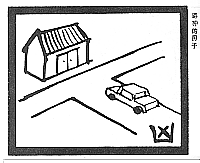My brother has just purchased his own house. Since my sister-in-law is a student of the art of fortune telling, she invites her teacher for advices on some details for the hanging places of paintings and ornaments, as well as what types of ornaments to be acquired.
Although we are actually a Roman Catholic family, everyone cannot help but eavesdropping on the details and perhaps making our own notes on the do-s and don't-s.
风fēng水shŭi is actually part of our daily practices. We more or less would put it into consideration whenever we have a new living or working space. It is not entirely out of superstition; it is more of "since I know this, might as well follow it" mentality. Hint or suggestion has a much profound influence than it appears to be. As long as we receive the hint or suggestion, it would be very difficult to not associate it with the consequences. After all, prevention is indeed better than cure.
So what is风fēng水shŭi exactly?
The Chinese character风fēng means the "wind"; and 水shŭi means the "water". Wind of course refers to the air flow or air circulation; naturally water implies the humidity. In many centuries ago, careful observers - the well learned ancient Chinese environmentalists -noticed the importance of proper airflow and humidity in the living environment would affect greatly the residents in the house. People who lived in a house with proper air circulation and humidity tended to have better health, spirit, and most of all, wealth. Logically speaking, when a person is healthy, he/she tends to think positive thoughts, which lead to higher spirit; and with positive thinking and optimistic attitude towards life, the person is easier to achieve the goals in life - be it wealth or others.
But 风fēng水shŭi is more than just a practice of the early LOHAS living style. It also combines the housing interior hygiene and safety, as well as the community planning. My favorite example would be路lù 冲chòng, so let me use it to illustrate this claim.
路lù 沖chòng is the conflict with the road(s). A house at the end of a road, or a house at the junction of the roads, is unlikely to be on top of the 'must buy' list; especially the ones with its front door opening to 'greet' the roads. A 风fēng水shŭi master will explain that because a house sits on that kind of location receives煞shà气chì, the bad vibes, directly from the road(s). Any family that lives in a house like that would not only have bad fortune, but that members of the family may die from accidents or other unnatural causes. From a modern community-housing planner's point of view, the statistics do show that houses situated at the end of a straight road have higher accident rates. Reasons being that, especially when the road is wide and the traffic is busy, a driver, when speeding, may not have sufficient response time to turn the car to the right or left, and often runs straight into the house at the end of the road. This is even true in the old days when horses were the 'car wheels'. So bad vibe or not, when the accident did/does happen, family members did/do die from accidents and/or other unnatural causes.
There are more examples in the风fēng水shŭi taboos that actually have their scientific explanations, and that the superstition sometimes is just a unspoken law/regulation established for the commoners to abide in avoiding dangers. Next time when I encounter another one, I will bring it up again and share with you.



No comments:
Post a Comment